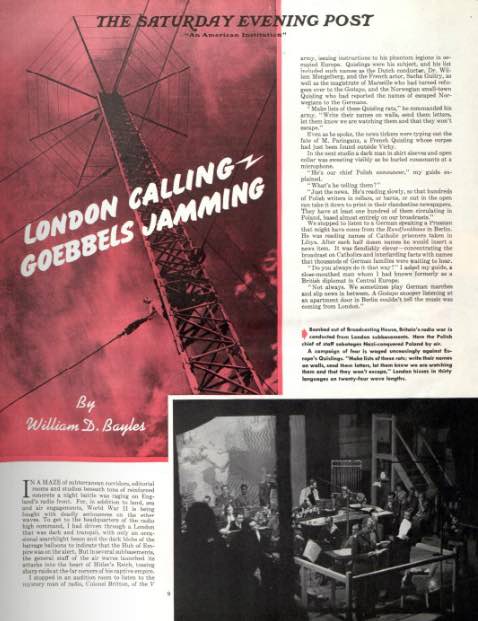How the British Beat the Germans at Their Own Propaganda Game: 75 Years Ago
 Large-scale public propaganda campaigns were introduced in World War I, but they became more far more elaborate, and effective, in World War II.
Large-scale public propaganda campaigns were introduced in World War I, but they became more far more elaborate, and effective, in World War II.
In 1914, Allied propaganda consisted of simply spreading stories of German soldiers committing atrocities. Newspaper readers in both Allied and neutral nations were told that innocent men, women, and children were being maimed and killed in Belgium and France by German troops. Though never substantiated, the stories helped swing public opinion firmly against the Germans.
By World War II, Germany had become master of the art of propaganda, building one of the most sophisticated mis- and dis-information machines in the world. The Minister for Enlightenment and Propaganda, Joseph Goebbels, knew the importance of radio in spreading the Nazi message. He authorized the manufacture of inexpensive radios that would be affordable to more people. He even gave away free radios on his birthday.
Radio broadcasts played on the familiar themes of German National Socialism. Wrapped around music programming, Goebbels would include short pieces that appealed to Germans’ resentment at the outcome of the last war and their depressed standard of living, which he skillfully blamed on Jews, communists, and unpatriotic Germans. Through his efforts, the Nazi government gained the loyalty of otherwise sensible Germans and convinced them to sacrifice their efforts, fortunes, and lives for Hitler.
But England soon proved as adept at the game as Germany. In “London Calling — Goebbels Jamming,” William Bayles describes the impressive operations at the British Broadcasting Corporation, which provided news and persuasion throughout Europe and the Middle East.
The BBC enlisted the help of national resistance heroes like Queen Wilhelmina of Holland and Charles De Gaulle of France to speak to their conquered people over the airwaves. It also drew on a vast pool of refugees who’d sought asylum in England and who could write and speak languages of all the major nationalities in the war zones: 24 nationalities in all — from Albanians to Turks – prepared “ammunition for the radio offensive against Hitler.”
And while the Germans distorted the facts in their news, the British made a point of being honest in their reporting. They believed the blitz-propaganda machine, which repeated lies until they were believed, would someday fail. When Hitler eventually exhausted the trust of the German people, they would know where to find a more reliable source.
The British were also particularly good at using an enemy’s words against them. The BBC would edit clips from Hitler’s different radio speeches to show him repeatedly contradicting himself.
Perhaps nothing was more effective than the way the BBC ended its German broadcasts every day. Listeners heard “a clock ticking hollowly and a ghostly voice intoning: ‘Every seventh second, a German soldier dies in Russia. Every seventh second … hour after hour … day after day … Is it your husband … your son … your brother? Shot … drowned … frozen … every seventh second … seven … seven.’”
